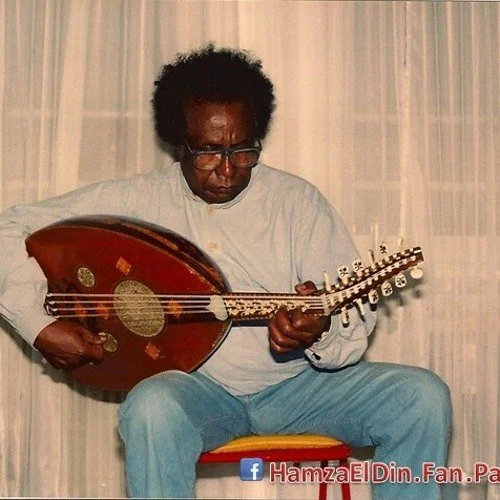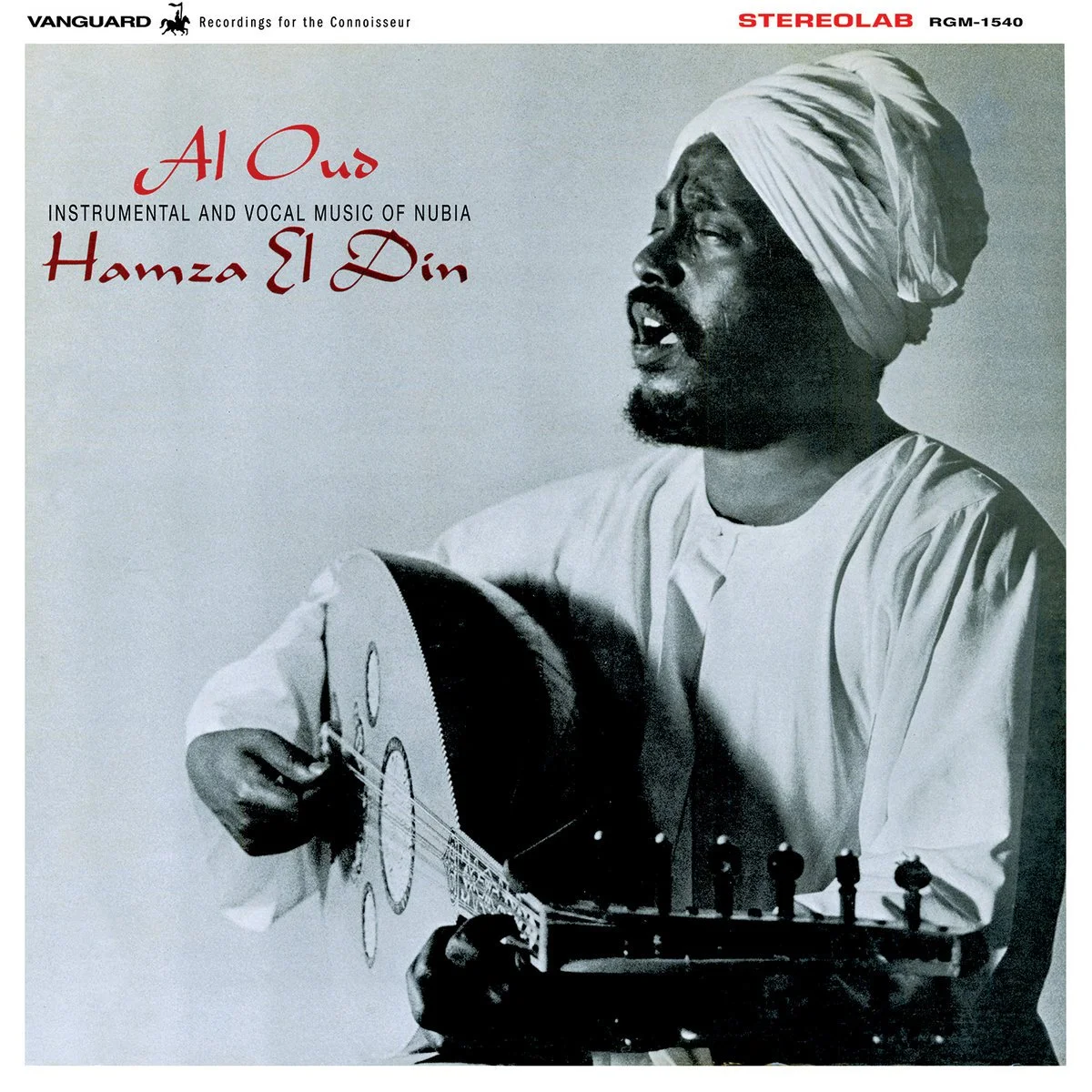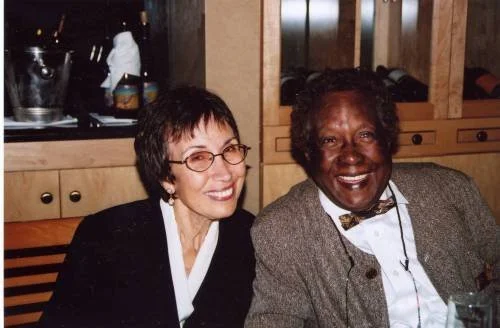Hamza El Din: A Pioneer of World Music
Words by Reenal Igboanugo
Hamza El Din is a pioneer of world music. He blended Egyptian and Nubian musical stylings on the oud and tar, creating a beautiful blend of nostalgic melancholy tunes. He was born in 1929 in Toshka, a village in the ancient territory of Nubia. After learning that the building of the Aswan High Dam would flood his hometown, erasing an entire ancient kingdom and cradle of civilization, he became determined to preserve Nubian heritage.
Hamza El Din, an electrical engineer by training, was born in 1929 in the village of Toshka — a small, ancient settlement in Egypt’s southern Aswan governorate, once part of the historic Kingdom of Nubia. Immersed in the rich culture of his village, Hamza grew up surrounded by the sounds of the Nile, the chants of dervishes, the rhythms of mystical Islamic rituals, and the ever-present pulse of music. Though his profession would eventually lead him away from his homeland, the spirit of Toshka, a name that fittingly means “homeland” in the Nubian language, remained central to his identity. That very language, along with much of the Nubian culture, would later face erasure with the building of the Aswan High Dam in the 1960s, a loss that Hamza would quietly resist through his music and memory.
Nubia was a kingdom present before the Arab Republic of Egypt, before President Nasser’s rise to power, before British and French colonization of Egyptian land, before Romanization of the ancient Egyptian peoples, before Islam, and before the Pharaohs. Nubia was intrinsic and embedded in the lifeblood of what we call modern-day Egypt, a kingdom that was wiped away by industrialization. Modernization is the idea that plagues us and haunts us due to its results. Because of it, we believe that to move forward as a society, we must disregard the past and those ‘backward’ people who live in it. This was the reality in which Hamza El Din, the engineer, was living. He moved to Cairo and began working on the Egyptian national railways. However, he learned about the plans to build the Aswan High Dam, and this moved something within his spirit. Something deep inside of him told him that if he did not move now, his culture, his people, would be lost forever beneath the waters of the Dam.
He changed careers and began studying music at Cairo University and later at the Accademia Nazionale di Santa Cecilia in Rome. Returning to Egypt, he continued his studies at Ibrahim Shafiq's Institute of Music and the King Fouad Institute for Middle Eastern Music and received a government grant to continue his research into Nubian music.
But how could he collect the music of a people whose homes were vanishing and communities scattering? With nothing but his Oud and a donkey, Hamza El Din journeyed across Egypt, gathering Nubian folk songs and giving them new life through performance. While the Oud was not traditionally part of Nubian musical heritage, El Din, an exceptional master of the instrument, used it, alongside the Tar, to weave together Egyptian and Nubian musical traditions into hauntingly beautiful, nostalgic melodies.
Through his innovative fusion of Nubian rhythms and Arabic classical elements, El Din reimagined the music of his homeland. He not only preserved its essence but reimagined it, embedding Nubian sounds into the wider Arabic musical canon and bridging two cultures with each resonant stroke of his Oud.
Above the spiritual importance of El Din’s music, El Din is crucial in the historical preservation of Nubian Music. Collecting these folkloric songs, performing them and singing them, and making sure that they would be heard for generations to come was crucial to the remembrance of Nubian culture that could've been wiped away. The land of Toshka is now a collection of lakes that are continually overflowed by Lake Nasser, but if it wasn’t for the work of El Din, who would’ve remembered that Toshka was once a beautiful village within Nubia?
Hamza El Din, later, moved to the U.S and became a mentor and teacher to other musicians. There, he connected with many musicians through his revolutionary ethnomusicology teachings. Being more than just a mentor, but a beloved friend and a beloved husband too. He was loved by his students, one of them being Joseph Rowe. In a deeply intimate memoir, Rowe says, “I mourn the passing of my old friend, but I still sense the Presence of my Friend. It happened recently, after a spasm of grief, when I suddenly decided to listen to "Escalay" again, for the first time in years ... but mostly it happens in Silence”. He was loved by his wife, Nabra. Although Nabra is Japanese, her name in Nubian means “pure gold”, and according to many, she was a pure heart and delight, just as El Din was during his life. Passing away in 2006, he left behind a legacy of both musical prowess and a great lesson in maintaining cultural heritage wherever you go, a lesson many Nubian diaspora carry into the modern world
To learn more about Hamza’s legacy, watch one of our community presentations by Shady Daoud:
Sources
From Times Staff and Wire Reports. “Hamza El Din, 76; Musician Popularized North Africa’s Ancient Traditional Songs.” Los Angeles Times, 30 May 2006, www.latimes.com/archives/la-xpm-2006-may-30-me-din30-story.html. Accessed 6 Nov. 2024.
Hamlin, Jesse. “Hamza El Din -- Nubian Musician Who Played with Grateful Dead.” SFGate, 26 May 2006, web.archive.org/web/20170316000133/www.sfgate.com/bayarea/article/Hamza-El-Din-Nubian-musician-who-played-with-2518339.php. Accessed 6 Nov. 2024.
Pareles, Jon. “Hamza El Din, 76, Oud Player and Composer, Is Dead.” Archive.org, 25 May 2006, web.archive.org/web/20190327093031/www.nytimes.com/2006/05/25/arts/25din.html. Accessed 6 Nov. 2024.
Rowe, Joseph. “Mémoir about Hamza El Din by Joseph Rowe.” Naturalchant.com, 2019, naturalchant.com/naturalchant-en/Hamza-en/index.html. Accessed 6 Nov. 2024.
Tannous, Alexandre, and Daniel Grinstead. “Escalay: Oud Music from Nubia, Hamza El Din.” Yearbook for Traditional Music, vol. 30, 1998, p. 180, https://doi.org/10.2307/768578. Accessed 2 Nov. 2019.





